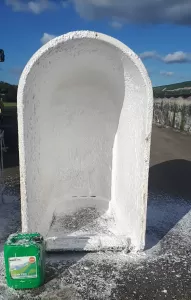Cleaning calf hutches an easy job with CleanPro foaming product
A calf is continuously surrounded by micro-organisms. Only a few of those are true ‘pathogen’ and can, therefore, cause diseases. In order to keep these pathogens away, we aim for the highest possible level of hygiene.
One of the most important aspects of safeguarding hygiene is cleaning the calf hutches. The use of a cleaning product will improve hygiene for your calves. The hutches will be cleaner and the number of bacteria is drastically reduced.
A study was conducted into the effects of the foaming product. During this study, a comparison was made between just high-pressure cleaning and high-pressure cleaning after the hutches were treated with the CleanPro foaming product. The differences are considerable. High-pressure cleaning alone does not really properly clean the hutches. If you use CleanPro, the hutches are smoother, cleaner and there will be less of an odour. It even removes all fly droppings and (colostrum) caking from the hutch. Another advantage is that high-pressure cleaning will be about 25% faster after foaming the hutch compared to using no foam.
During the study, CleanPro was also compared with two other popular cleaning products. Whereas the other cleaning products slide off the hutch within minutes, CleanPro sticks to the hutch well. This gives the product more chance to have an effect. This is an important property of CleanPro, making it highly effective.
Reference:
Young stock rearing process deserves attention
Janne van de Ven, student at the Has Hogeschool conducted a study into the growth, health and time spent during the young stock rearing process. Dairy farms often pay less attention to this process, because in the short term, it has a lesser influence on operating results compared to the care of dairy stock. However, a good young stock rearing process definitely yields a return. Examples include a lower calving age of heifers, extra milk during the first lactation and more room for phosphate because there is no need to keep so much young stock. A longer rearing process means more rearing days, which cost an average of € 2.50 per day. The study was conducted among 30 dairy farms. This article is based on the study results.

Share this message

Agros Expo 2022
On January 25-27, Moscow will host the Agros Expo 2022 international exhibition of animal husbandry, breeding and forage production. We invite you to familiarize yourself with our bestsellers - Comfort and Open Top Premium calf hutches! Booth K36,...

In conversation with...
Filip and Anja from dairy farm De Brabander LV Filip (49) and Anja (47) De Brabander-Vandierendonck have enjoyed running a dairy farm with 260 dairy cows together in the municipality of Zomergem (Lievegem) Belgium for the past 27 years....

Reduce labour by up to 20% in the first four months
Investments in practical housing pay off. Calf rearing is a labour-intensive part of running a dairy farm. Proper calf rearing requires attention and care. Yet at many farms, it's possible to greatly reduce the amount of work. Labour savings...

More growth and health in outdoor housing
Thorough calf rearing is essential for a good performance as a dairy cow. With a high feeding regime and an all-in, all-out housing in small, fixed groups, calves perform best. This according to research by the Dutch Dairy Campus/WUR with 224...

More attention for calf housing
In recent years, more and more attention has been paid to how calves are fed. This is not surprising, considering that the care given to young calves will determine their performance as dairy cows in the future. Research has shown that intensive rearing...

Plastic versus Polyester
Choice of materials determines lifespan. Calf hutches made from plastic or polyester: What will you choose? At first glance, they might seem similar. Yet there is a world of difference. Arjan Harbers, Sales Manager at VDK Agri,...

VDK Agri Open Top Premium wins Innov’SPACE!
VDK Agri has won a 2020 Innov’SPACE for the Open Top Premium Single and Duo! Our colleague Jean Bernard Béranger received the award yesterday.

New products!
VDK Agri launches not one but three new products, among which a new line for indoor accommodation. These calf pens are suitable for dairy farmers who want to keep calves indoors or under a roof. The products were developed on the basis of the latest...
